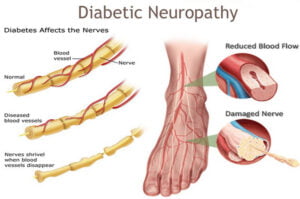Contents
Neuropathy
 Neuropathy, the most common type of nerve disorder is a condition that affects the nerves outside the central nervous system. It can affect any of your five senses-touch, smell, taste, vision, or hearing. Neuropathy pain is often described as tingling, burning, or sharp shooting pain. You might also experience numbness or weakness in your hands and feet. There are many different types of neuropathy.
Neuropathy, the most common type of nerve disorder is a condition that affects the nerves outside the central nervous system. It can affect any of your five senses-touch, smell, taste, vision, or hearing. Neuropathy pain is often described as tingling, burning, or sharp shooting pain. You might also experience numbness or weakness in your hands and feet. There are many different types of neuropathy.
It affects the nerves outside the central nervous system, it can be very painful and debilitating. There are many different types of neuropathy, and they affect people differently. Neuropathy is diagnosed by the symptoms that are displayed. But there isn’t a single test to diagnose it. Some of the most common causes include diabetes, HIV/AIDS, alcohol abuse, autoimmune disorders like lupus or shingles, vitamin deficiencies (like B12), and infections.
Types Of Neuropathy
There are different types of neuropathy that are caused by different reasons. All of which can have some negative effects on the individual. One type of neuropathy is diabetic neuropathy, which is caused by diabetes mellitus. Another type is pressure-induced neuropathy, which occurs when individual experiences high blood pressure or Blood Type A. Vitamin deficiencies can lead to peripheral neuropathy, while typhoid fever may cause a person to develop Guillain-Barre syndrome.
There are other ways in which the condition can develop, but due to the nature of this disorder. It is important to know what you are up against to get a proper diagnosis.
Diabetic Neuropathy
 Diabetic neuropathy is a form of neuropathy that affects people with type-1 diabetes and also those who have type-2 diabetes. It’s characterized by nerve damage, specifically in the legs. The symptoms can start as soon as a person begins having high blood sugar levels. Or may not appear for over ten years. There isn’t a sure way to know for sure whether you’ll develop diabetic neuropathy or not. But people who have a family history of repeated infections are at higher risk. Other factors that contribute to the development of diabetic neuropathy include having type-1 diabetes for more than fifteen years and receiving treatment with insulin injections.
Diabetic neuropathy is a form of neuropathy that affects people with type-1 diabetes and also those who have type-2 diabetes. It’s characterized by nerve damage, specifically in the legs. The symptoms can start as soon as a person begins having high blood sugar levels. Or may not appear for over ten years. There isn’t a sure way to know for sure whether you’ll develop diabetic neuropathy or not. But people who have a family history of repeated infections are at higher risk. Other factors that contribute to the development of diabetic neuropathy include having type-1 diabetes for more than fifteen years and receiving treatment with insulin injections.
Diabetic neuropathy is end-organ damage to nerves caused by diabetes mellitus over time. Symptoms include numbness and tingling sensations, Fortin’s sign, foot drop, neuropathic pain, and ataxia.
Peripheral Neuropathy
 Damage to the peripheral nervous system often involves both sensory and motor symptoms. Signs and symptoms vary depending on the site of damage. But can include burning or tingling sensations, numbness in different parts of the body, spontaneous electric shock-like feelings, and pain.
Damage to the peripheral nervous system often involves both sensory and motor symptoms. Signs and symptoms vary depending on the site of damage. But can include burning or tingling sensations, numbness in different parts of the body, spontaneous electric shock-like feelings, and pain.
Symptoms Of Neuropathy
Symptoms of neuropathy are pain anywhere on the body, tingling feelings throughout the body, numbness anywhere on the body, more sensitivity to touch. Especially on certain parts of the body, muscle cramps anywhere on the body, muscle weakness especially in the legs and feet. Another symptom is that you may experience blurred vision. Other symptoms are reduced reflexes or reduced ability to sense vibration in certain parts of the body.
The symptoms that neuropathy causes are often described as-

- Tingling
- Burning
- Sharp shooting pain
- Numbness or weakness in your hands and feet
Some of the most common treatments for neuropathy include medications such as antidepressants, anticonvulsants, opioids, and topical anesthetics; physical therapy; and surgery. It is a terrible condition that can affect anyone at any time. It’s important for everyone to know about this debilitating disorder.
Peripheral neuropathy is a condition that affects nerves in the extremities, causing them to become numb and painful.
The word “neuropathy” is often used interchangeably with “nerve pain,” but this isn’t technically correct. This disease causes numbness and pain, while nerve pain usually causes sharp, shooting, unbearable stabbing sensations. Neuropathy is frequently caused by an underlying disease or disorder such as diabetes.
“Diabetic neuropathy” is the most common form of this condition.
Chronic pain is very often experienced by patients with diabetes. But anyone with neuropathy will typically describe their discomfort as painful or unpleasant “pins and needles” sensations that range from mild to intense in different parts of the body. It’s usually worse at night when resting or sleeping, and many patients wake up with pain or numbness in their hands and feet.
The symptoms of peripheral neuropathy may look like other conditions or medical problems. Always consult your doctor for a diagnosis.
Causes Of Neuropathy
The causes of neuropathy are quite varied. Some of the most common causes are diabetes, alcoholism, vitamin deficiency, kidney failure, HIV/AIDS, HIV infection treatment with certain medications (e.g., some cancer treatments), exposure to toxins such as lead and arsenic, chemotherapy, and radiation therapy used in cancer treatment, systemic lupus erythematosus, autoimmune hepatitis, sickle cell disease or other genetic disorders. That results in hemolytic anemia or a low level of oxygen in the blood.
In addition, some medications can cause neuropathy. These drugs include certain classes of cholesterol-lowering drugs (statins), cancer chemotherapy, and diabetes medications. Such as Metformin (Glucophage) and other oral hypoglycemic agents. People taking these drugs should discuss their symptoms with their physicians.
People who have neuropathy may also have other medical conditions. Such as high blood pressure (hypertension), thyroid disorders, lupus, or celiac disease.
The symptoms of neuropathy vary depending on the type of neuropathy and what parts of the body are affected. Some types cause feelings of numbness or tingling.
Risk Factors

A few risk factors of neuropathy are diabetes, kidney failure, and kidney stones. Other factors that can cause neuropathy are lack of vitamin B12, vitamin B1, calcium deficiency, and aluminum toxicity.
Diabetes is the most common cause of neuropathy. Longstanding diabetes can damage small blood vessels in the body, especially those with filaments that transport oxygen to the nerve cells. If these blood vessels are damaged or destroyed, less oxygen will be delivered to the nerve cells, which causes neuropathy. Over time, this creates sores, wounds, and ulcers on the feet. Another symptom of neuropathy is that a person may not notice when there is a small wound or sore because the nerve damage inhibits pain response from occurring in the feet.
People with kidney failure can suffer from neuropathy too. Kidney disease affects how well the kidneys cleanse the blood by removing waste, salt, and water. It also affects the levels of certain chemicals that carry nerve impulses, such as sodium and potassium. These changes can cause neuropathy by affecting muscles, which decreases feelings in the hands and feet.
Kidney stones affect the proper function of many organs in the body, including nerves and muscles. An individual with kidney stones may experience tingling or burning sensations in their hands, cramps in their feet, muscle weakness, and difficulty maintaining balance.
Preventions For Neuropathy
Neuropathy is an illness that can occur when there is damage to the neurons in your body, according to The Brain Foundation. You can’t necessarily avoid this illness by making lifestyle changes, but you can try to prevent it by eating healthy, getting enough exercise, and not drinking alcohol excessively. This man wanted to learn how he could prevent his illness from becoming worse. So he asked me my opinion on the matter.
Here are three ways I thought this person might be able to stop his neuropathy from getting any worse.
Eating Healthy
 Eating healthy can help you stave off most illnesses, including neuropathy. Make sure to eat lots of leafy greens and other vegetables to get proper amounts of vitamins and minerals. If you don’t like vegetables, fruits can also be good for you. Avoid processed foods as much as possible because these foods typically contain too much sodium and sugar for your body to handle. Also, try to avoid dairy products unless they are unsweetened yogurt or sour cream because of the high calcium content.
Eating healthy can help you stave off most illnesses, including neuropathy. Make sure to eat lots of leafy greens and other vegetables to get proper amounts of vitamins and minerals. If you don’t like vegetables, fruits can also be good for you. Avoid processed foods as much as possible because these foods typically contain too much sodium and sugar for your body to handle. Also, try to avoid dairy products unless they are unsweetened yogurt or sour cream because of the high calcium content.
Exercise Regularly
Exercise is also helpful for staving off neuropathy. It helps with your circulation, which makes it easier for your body to send nutrients where they need to go and carry away toxins that can cause damage if allowed to stay in one place too long. Also, exercise keeps you healthier because your immune system will be stronger if you are active.
Limit Alcohol
Finally, alcohol is known to cause damage to the neurons in your body. Even drinking one day a week can be enough to cause some permanent damage to your brain’s nerve cells, so try not to drink any alcohol on a regular basis or at all if possible.
The man thought it would be good for him to follow these tips in order to keep his neuropathy from getting too serious. If you are concerned about how to keep your nerve damage from affecting your daily life, consider following these three steps.
Neuropathy is a complex illness that can cause damage to the neurons in your body. There are many things you can do to prevent this. But it’s important to note that it is not possible to prevent the disease by making lifestyle changes alone. If you want more information on how you might keep your nerve damage from affecting your daily life, follow these three steps. Eat healthily, exercise regularly, and avoid drinking alcohol excessively. This should help get rid of any pesky neuropathies.
Diagnosis
Properly diagnosing the underlying condition causing neuropathic symptoms is important because its treatment is possible. The patient can get relief from neuropathic pain with medications that affect neurotransmitters in the brain. For example, tricyclic antidepressants and antiseizure medications. In many cases of neuropathy, diabetes is a major contributor to the condition. Diabetes affects more than 20 million people in the United States alone, accounting for 75-80 percent of all cases of neuropathy. The number of cases continues to rise due to the aging population, putting people at higher risk for developing diabetes and other age-related diseases.
The cause of damage in sensory nerves is the result of chronically high glucose levels in diabetics, causing pain and sensory loss in the feet. One way cardiovascular exercise may help diabetics is by improving the function of blood vessels, which may allow better control of blood sugar levels. In a study on mice, those who ran regularly had healthier sensory nerves compared to their sedentary counterparts. Diabetics who exercised were able to decrease their glucose levels and increase enzyme activity. It helps metabolize glucose in nerve cells for energy. Thus reducing neuropathic symptoms.
Neuropathy Treatment
 There are no current treatments for neuropathy, however, there are ways to help treat neuropathy. To help treat neuropathy, get plenty of rest and stay hydrated throughout the day. You can also try to avoid foods that contain preservatives and limit your intake of salty foods. Stay away from alcohol because it will dehydrate you and make your kidneys work harder which can worsen kidney disease. Also if you have diabetes, then you should monitor your blood sugars on a daily basis.
There are no current treatments for neuropathy, however, there are ways to help treat neuropathy. To help treat neuropathy, get plenty of rest and stay hydrated throughout the day. You can also try to avoid foods that contain preservatives and limit your intake of salty foods. Stay away from alcohol because it will dehydrate you and make your kidneys work harder which can worsen kidney disease. Also if you have diabetes, then you should monitor your blood sugars on a daily basis.
Monitor your blood pressure if suffering from neuropathy. If higher than normal, it could be an indicator of kidney disease or diabetes, so consult a doctor. The treatment of symptoms of neuropathy is wearing comfortable shoes and keeping your feet clean at all times. If you have a wound or sore. It is important to take care of it. So that the infection does not spread. Still, if this occurs, surgery may be the only solution for removal.
There are various treatments available including surgery. But there is no cure for neuropathy. However, there are many treatments available to help relieve the symptoms.
The first approach to neuropathic pain is usually conservative, like physical therapy, taking anti-inflammatory drugs, or using topical agents. More invasive treatments can involve therapies that use magnetic fields, ultrasound, or electrical currents. However, these are often only short-term solutions and may not come under insurance. If conservative treatment fails, the next step is usually surgery.
Does Neuropathy Cause Death?
The main cause of death in people who have neuropathy is cardiovascular disease. It may happen when they get up and move around, commonly called “ambulatory” issues. It is when you go from laying down to standing up. Another cause of death is that you could fall because it causes muscle weakness and muscle cramps which would affect your balance. If there are any open wounds, which happens often for people with diabetes, the risk of infection increases.
Most people who have neuropathy, also suffer from other health conditions such as diabetes. And if left untreated both of these diseases could lead to serious health issues. One of the main reasons is because having diabetes increases your risk of developing kidney disease. If these diseases do not get treatment at the right time. They can lead to cardiovascular problems, infections, renal failure, or foot ulcers which may require amputation.
A Word From MantraCare
Neuropathy could be a complication of diabetes. If you are looking for the treatment of neuropathy or diabetes, then contact our team today.
Do you want to get rid of diabetes? Join our online diabetes consultation program and reverse your Diabetes naturally through lifestyle changes such as a Personalized Diet plan, Exercise, dieticians, and health coaches.


